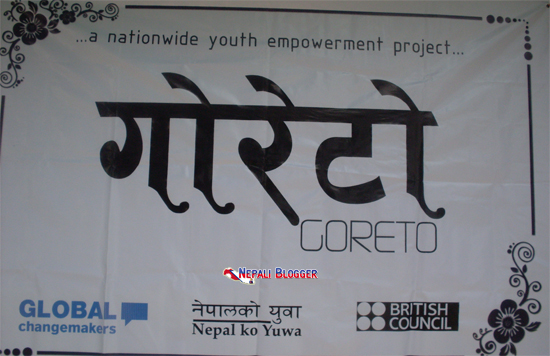Youths are the future of Nepal. They are the ones to change the face of our country in near future and fathers of tomorrow. Currently, 39.7 percent of Nepalese are less than 14 years of age, and the median age of the country’s population is 19 years. The best way to build and perpetuate development is through educating and empowering these young minds but things are going other way. We continue to be pushed into huddles of inter-youth disputes, and our leaders have shown very little commitment to progress on this country. Further all these young minds are also deprived of opportunities to make a difference. In all these circumstances, a new hope has arrived in the form of a project- GORETO.
The nationwide youth empowerment project, Goreto, is a campaign that aims to aware high school (Grade 9-12) students about the need for the development of Scholarship, Leadership and Citizenship (SLC) aspects in their life. The campaign will provide inspirational empowerment sessions and capacity building trainings to these students, equip them with ‘change making’ tools, and as a final outcome, help them devise their own sustainable community oriented action programs to put into practice their new ideas.
This project was initiated by Nimesh Ghimire, 19 years ‘young’ Nepali, from the support of British Council, Global Change Makers and Nepal Ko Yuwa.
“This campaign will directly engage and involve at least 1500 high school students, from at least three schools in each of the five development regions of Nepal. All these programs will be led, run and managed by high school graduates.” Nimesh told NepaliBlogger.
Project Goreto mainly focuses mainly on:
i) Scholarship: Scholarship refers to the intellectual ability of any person, and can only be nurtured when people not just learn for the sake of learning but do it with their own drive and passion. The general picture suggests that much of Nepal’s education system is all about natural sciences, and people shun students who opt for social sciences. This is wrong. Every student is unique with different tastes and abilities, and one can only grow as a quality person if they pursue their interests. The Scholarship aspects of the talk should focus on inspiring the high school students to realize the inner call of their life, to encourage them to pursue their interests. Only then we can expect a Nepali society full of intellectuals, true and passionate to their interests, ready to offer their skills for building our society.
ii) Leadership: Nepal needs leaders. Not just political, but social leaders, leaders in science, leaders who can handle the economy—cream of the crop who can work together to bring change home. We believe that we need to ‘catch students young’ and make them realize the need for initiatives in filling the voids they see. We need leaders who create change.
iii) Citizenship: Leadership trait is alone not enough for inspiring the people to thrive for a better community around them. Intellect ability and leadership attribute blended with ethics is imperative for preparing the next generation of holistic leaders who put national interest first and aid in setting up institutions critical for long term economic and political stability of Nepal.

Recently a group of students successfully completed this project in some places of Nepal namely Biratnagar, Pokhara, Damak, Myagdi and so on. The project is still going on strong and has shown the hope that it will bring youth empowerment gradually but in fast pace.
 By Sabin Gnawali
By Sabin Gnawali
Author is an A-level graduate from Kathmandu, Nepal. He loves writing and has won amy awards in different competitions; the most recent one is the winner of Cambridge University’s essay writing competition on the ocassion of its 150th anniversary.


